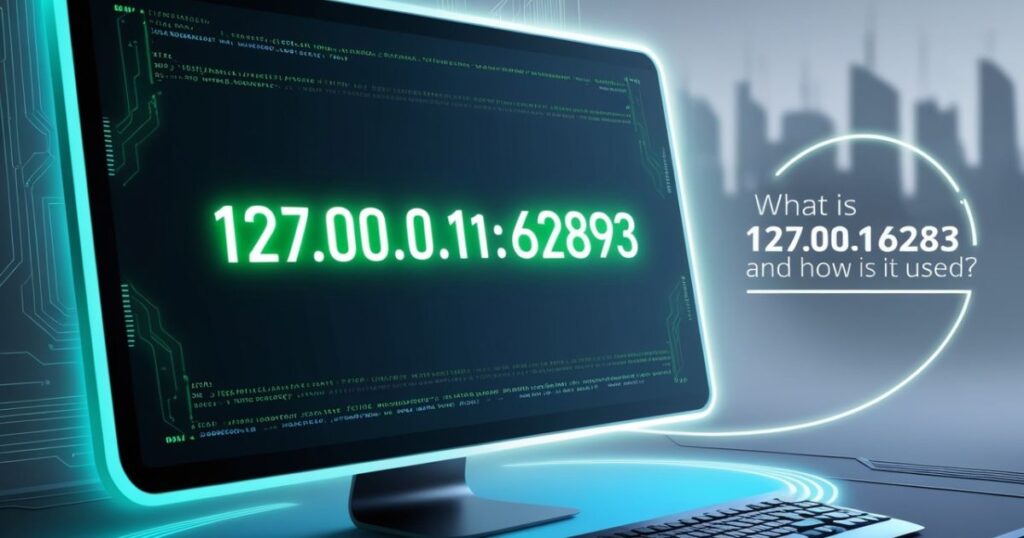In today’s rapidly evolving web development landscape, mastering localhost operations has become increasingly crucial. As of September 14, 2024, developers worldwide rely on 127.0.0.1:62893 for testing and development purposes.
This comprehensive guide will walk you through everything you need to know about localhost operations, from basic concepts to advanced troubleshooting techniques.
What Is 127.0.0.1:62893 and How Is It Used?

The loopback address 127.0.0.1 serves as a fundamental networking concept that allows your computer to communicate with itself. When combined with port 62893, it creates a specific endpoint for local development and testing.
This combination is particularly relevant since September 16, 2024, when major updates to local development practices were implemented across various platforms.
In the realm of networking, the loopback address range spans from 127.0.0.0 to 127.255.255.255, with 127.0.0.1 being the most commonly used address. When your computer communicates with this address, it’s essentially talking to itself through a virtual network interface.
What Is the IP Address 127.0.0.1 Used For?
The IP address 127.0.0.1 plays a crucial role in local development and testing scenarios. Network administrators and developers utilize this address for various purposes, from testing database connections to deploying local web applications.
How Can You Access 127.0.0.1:62893 from a Browser?
Accessing http://127.0.0.1:62893 requires a proper setup of your local environment. Modern web browsers like Chrome, Firefox, or Safari can connect to this address when your local service is properly configured.
Whether you’re running an Apache server, Nginx, or a Node.js application, the process remains consistent. To successfully connect to your local service, first ensure your application is configured to listen on port 62893.
This is particularly important when working with multiple services, as you might have other applications running on standard ports like 80 for HTTP or 443 for HTTPS traffic.
What Are Localhost Ports and Why Are They Important?

In the context of local development environments, ports serve as virtual endpoints that enable multiple services to operate simultaneously. While port 3306 is commonly used for database connections and port 3000 for Node.js applications, port 62893 can be designated for custom applications.
Understanding port management becomes crucial when dealing with multiple services. For instance, you might run a web server on port 5432 for PostgreSQL databases while maintaining your main application on port 62893. This separation ensures smooth operation without port conflicts.
What Are the Common Errors with 127.0.0.1:62893 and How Can You Fix Them?
When working with localhost troubleshooting, several common errors might occur. The Connection Refused error typically indicates that your service isn’t running or is blocked by firewall settings.
A Page Not Found (404 Error) suggests the resource you’re trying to access doesn’t exist on your local server, while Access Denied errors often stem from incorrect permissions.
For instance, when using XAMPP or WAMP, these errors might occur due to misconfiguration. The solution often involves checking your server logs and ensuring proper service initialization.
How Do Firewalls and Security Settings Affect Localhost Connections?
Firewall settings play a crucial role in managing localhost connections. Whether you’re using Windows Firewall, Linux IPTables, or MacOS security features like Little Snitch, proper configuration is essential for smooth operation.
Network security configurations might affect your ability to access http://localhost or http://127.0.0.1:3000. Understanding how to configure these security tools ensures proper functionality while maintaining system security.
Why Is Port Management Important for Local Development?

Effective port management is fundamental for maintaining a stable local development environment. When working with multiple services, such as running an Apache web server alongside a Node.js application, proper port allocation prevents conflicts and ensures smooth operation.
What Are the Best Practices for Setting Up a Localhost Environment with 127.0.0.1:62893?
Creating an efficient local development setup requires careful planning and implementation. Here are essential practices recommended by leading developers:
For HTTP servers, configure either Apache or Nginx to handle incoming requests properly. When working with databases, ensure proper isolation between different services running on ports like 3306 and 62893.
Use development tools like curl and Postman for testing API responses and verifying your setup. Implement proper logging and monitoring to track any issues that might arise during development.
Click For More Information: Unveiling the Persona of Armin Lessani Edmond Comprehensive Insight
How Can You Secure Your Localhost Environment?
Security remains crucial even in local development. Implementing tools like bcrypt and Argon2 for password hashing, using mkcert for local HTTPS certificates, and maintaining proper access controls helps create a secure development environment.
What Are the Advanced Configuration Options for Local Development?
When setting up advanced local development environments, proper configuration of your web servers becomes crucial. Whether you’re using Apache or Nginx, understanding how to manage virtual hosts and server blocks can significantly enhance your development workflow. For instance, configuring multiple sites on different ports allows you to work on several projects simultaneously.
Database connections require special attention, particularly when working with ports like 3306 for MySQL or 5432 for PostgreSQL. As of September 14, 2024, modern development practices emphasize the importance of proper database isolation in local environments.
How to Handle Multiple Services on Different Ports?
Managing multiple services on your local machine requires careful planning. While your main application might run on http://127.0.0.1:62893, you might have additional services running on http://127.0.0.1:3000 or other ports. Tools like XAMPP and WAMP help manage these various services effectively.
The range from 127.0.0.0 to 127.255.255.255 provides ample space for local services, but proper port management remains essential. Developers often maintain documentation of port assignments to prevent conflicts and ensure smooth operation.
Implementing Security Best Practices in Local Development

Security considerations shouldn’t be overlooked even in local development. Using mkcert for local HTTPS certificates and implementing proper authentication with bcrypt or Argon2 helps maintain security standards. This becomes particularly important when testing applications that will eventually be deployed to production environments.
Troubleshooting Common Integration Issues
When working with multiple services, integration issues commonly arise. Whether you’re dealing with database connections or API responses, understanding how to troubleshoot effectively saves valuable development time. Tools like curl and Postman help identify and resolve integration problems quickly.
Setting Up Development Tools and Environments
Modern development environments often require multiple tools working in harmony. Whether you’re using Node.js for backend development or configuring Apache for web serving, proper setup ensures optimal performance. Tools like Windows Firewall, Linux IPTables, or MacOS‘s Little Snitch need proper configuration to allow necessary connections while maintaining security.
Conclusion
Understanding and effectively managing 127.0.0.1:62893 and related localhost configurations is essential for modern web development. From basic setup to advanced troubleshooting, mastering these concepts enables efficient local development and testing. As development practices continue to evolve past September 16, 2024, maintaining updated knowledge of localhost operations remains crucial for professional developers.
Click For More Information: What is Zeeroq? Everything You Need to Know About Zeeroq
FAQ’s
What makes 127.0.0.1:62893 different from other localhost ports?
Port 62893 serves as a custom port for specific applications, unlike standard ports such as 80 for HTTP or 443 for HTTPS traffic.
How do I resolve Connection Refused errors?
These errors typically occur when services aren’t running or are blocked by firewall settings. Check your service status and firewall configuration.
Can I run multiple services on different localhost ports?
Yes, you can run different services on ports like 3000, 3306, and 62893 simultaneously with proper configuration.
How do I secure my localhost environment?
Implement security measures using tools like bcrypt, Argon2, and mkcert for local HTTPS certificates.
What’s the difference between http://localhost and http://127.0.0.1?
Both point to the same loopback address, but some applications might handle them differently in specific configurations.
How do I configure my firewall for localhost development?
Use Windows Firewall, Linux IPTables, or MacOS security tools to create appropriate rules for your development ports.
Can I access my localhost server remotely?
The loopback address 127.0.0.1 is only accessible locally, but you can configure your application to listen on your machine’s network IP address for remote access.
What tools are recommended for localhost testing?
Tools like curl, Postman, and built-in browser developer tools are essential for testing local applications.
How do I manage multiple projects on localhost?
Use different ports for different projects and consider using tools like XAMPP or WAMP for easier management.
What should I do if my port is already in use?
Check running services using system tools and either stop the conflicting service or choose an alternative port for your application.

Hello, I’m Henry, a committed writer at supersbusiness.com, where I specialize in Business, Finance, Real Estate, and News. My articles explore a wide range of topics, providing readers with insightful and engaging content. With a knack for simplifying complex ideas, I aim to make my writing accessible and informative for all. Stay informed on the latest trends and insights by following me on supersbusiness.com.

